It’s always fun when a tiresome book about the rules of the English language gets debunked and when some clever clogs points out that the prose of said tiresome tome is full of the very errors it decries.
So it was with Lynn Truss’s bestseller Eats, Shoots & Leaves: The Zero Tolerance Approach to Punctuation The book is this month’s starting point for Six Degrees of Separation, hosted by Kate of Books are my Favourite and Best. Kate chooses a starting point and anyone can play along with how that book links in a chain with six others.
I’ve not read this particular bestseller but apparently it contained egregious errors of punctuation and grammar. Louis Menand took Truss on in his review in the New Yorker (June 28th 2004)
Bad Comma
Lynne Truss’s strange grammar.
The first punctuation mistake in “Eats, Shoots & Leaves: The Zero Tolerance Approach to Punctuation” (Gotham; $17.50), by Lynne Truss, a British writer, appears in the dedication, where a nonrestrictive clause is not preceded by a comma. It is a wild ride downhill from there. “Eats, Shoots & Leaves” presents itself as a call to arms, in a world spinning rapidly into subliteracy, by a hip yet unapologetic curmudgeon, a stickler for the rules of writing. But it’s hard to fend off the suspicion that the whole thing might be a hoax.
 Attention to such niceties may have its place in the editing of accomplished and confident writers. And it’s always good for a cheap laugh. Think of all the misplaced apostrophes in shop window signs. Perhaps if we stopped obsessing on apostrophes in school people might actually understand how to use them – or just leave them off altogether which would be an improvement.
Attention to such niceties may have its place in the editing of accomplished and confident writers. And it’s always good for a cheap laugh. Think of all the misplaced apostrophes in shop window signs. Perhaps if we stopped obsessing on apostrophes in school people might actually understand how to use them – or just leave them off altogether which would be an improvement.
This obsession with the table manners of punctuation has no place in the lives of early literacy learners (aka children) and those who struggle to express themselves in writing. (It’s a plus to be able to identify the fish fork in a table setting but it doesn’t improve the taste of the fish or help the cooking.)
First Degree: Ronald Ridout
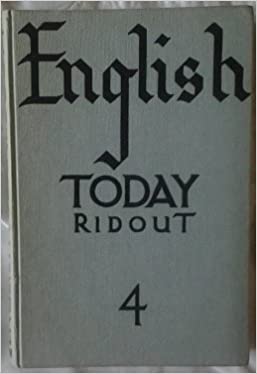 When I was at school – and the attempt was being made to drill me on the niceties of grammar and punctuation – we had English Today books 1-5 by Ronald Ridout. The American equivalent could well have been the even more ghastly Warriner’s Grammar.
When I was at school – and the attempt was being made to drill me on the niceties of grammar and punctuation – we had English Today books 1-5 by Ronald Ridout. The American equivalent could well have been the even more ghastly Warriner’s Grammar.
What a waste of time it all was.
Ridout actually made it to the Guinness Book of Records as the most prolific British textbook writer – 50 books and 91 million copies sold. Ridout considered himself a socialist and was censored in his early years of teaching for talking about Marxism.
At one time he had houses in London, Surrey, the Dordogne, Portugal, Ibiza, and St Lucia. He died a millionaire.
To some Ridout was the ultimate example of prescriptive language teaching – endless, boring, artificial, repetitive, decontextualized grammar and punctuation exercises. To Conservative policymakers he was the exemplar of proper standards and necessary discipline bringing order and structure into a world which otherwise would decay into crime and anarchy, The language wars have a long history.
We’ve allowed so many standards to slip…teachers weren’t bothering to teach kids to spell and to punctuate properly…if you allow standards to slip to the stage where good English is no longer better than bad English, where people turn up filthy…at school…all those things cause people to have no standards at all, and once you lose standards then there’s no imperative to stay out of crime. – (Norman Tebbit – then Chairman of the Conservative Party – Today, Radio 4 – 1985)
One thing at least – I don’t remember Ridout on one of the Tory party’s latest language obsessions – the ill-named fronted adverbial.
Second Degree: Where the cows go
The living language is like a cowpath; it is the creation of the cows themselves, who, having created it, follow it or depart from it according to their whims and needs
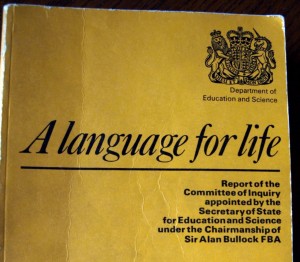 And that takes me to H.M.S.O and the official report of the Bullock Commission whose “A Language for Life” (1974) remains one of those essential founding documents for any serious discussion of – or thinking about – language, learning, and literacy. It nailed the Trusses and Ridouts of the world and put them firmly in their place when it came to early language learners.
And that takes me to H.M.S.O and the official report of the Bullock Commission whose “A Language for Life” (1974) remains one of those essential founding documents for any serious discussion of – or thinking about – language, learning, and literacy. It nailed the Trusses and Ridouts of the world and put them firmly in their place when it came to early language learners.
Jimmy Britton was a member of that commission and indeed his fingerprints are detectable all over it, and much to its advantage. Professor James Nimmo Britton was a member of a legendary group of teachers at London’s Institute of Education who were collectively responsible for leading the teaching of English in new, exciting, and enlightened ways. (Harold Rosen and Nancy Martin were also part of the gang).
Here are two paragraphs of informative common sense from chapter 11.
11.16 The traditional view of language teaching was, and indeed in many schools still is, prescriptive. It identified a set of correct forms and prescribed that these should be taught. As they were mastered the pupil would become a more competent writer and aspire to a standard of ‘correctness’ that would serve him for all occasions. Such a prescriptive view of language was based on a comparison with classical Latin, and it also mistakenly assumed an unchanging quality in both grammatical rules and word meaning in English. In fact the view still prevails. Letters to the press are rarely more fierce than when complaining of the way in which a particular word is being misused or used in a new sense. ‘Brutalise’ and ‘hopefully’ are two recent examples, and there are many precedents. Dr Johnson tried to eliminate ‘fun’, ‘clever’, ‘budge’, and ‘mob’; and it is ironical that the very word Swift used for fixing the language in a permanent and authorised condition was ‘ascertain’, which has completely altered its meaning since his day. One may regret some of the changes, which can deprive the language of valuable distinctions. One may decide to resist them and insist on keeping to existing forms, and this is natural and understandable. But if change is to occur it will in due time occur, since growth and change are essential characteristics of a language. Writing less than a hundred years ago Trollope used the past participle ‘gotten’; if it were uttered today it would be rejected as an intrusive Americanism. As one commentator has colourfully put it: ‘The living language is like a cowpath; it is the creation of the cows themselves, who, having created it, follow it or depart from it according to their whims and needs’. Montaigne said as much in the 16th century, when he remarked that only a fool would fight custom with grammar. Many of the rules in use today were invented quite arbitrarily by grammarians in the 17th and 19th centuries, including the embargo on the split infinitive and on the ending of a sentence with a preposition. Before the 18th century they are both to be found in common use, along with other constructions proscribed today. John Donne regularly split infinitives, and Burns was no stranger to the practice. In a letter to The Times in 1907, Bernard Shaw wrote: ‘There is a busybody on your staff who devotes a lot of time to chasing split infinitives. Every good literary craftsman splits his infinitives when the sense demands it. I call for the immediate dismissal of this pedant. It is of no consequence whether he decides to go quickly, or quickly to go, or to quickly go. The important thing is that he should go at once.’ And, of course, there is Churchill’s famous note in which he expressed his impatience with those who always struggled to avoid ending sentences with prepositions: ‘This is the sort of English up with which I will not put’.
11.17 We give these examples not to suggest a free-for-all, but to put prescriptive attitudes in perspective. One of the disadvantages of the prescriptive approach to language teaching is its negative aspect. Ironically, many of these manufactured additions to the language took on a special status in school textbooks, which often put the emphasis less on knowing what to say than on knowing what to avoid. Pupils not too certain of their ability with language would thus be looking for the gins and snares, to the equal detriment of their confidence and their writing. This kind of teaching has often inhibited a child’s utterance without strengthening the fabric of his language. It has nurtured in many the expectation of failure and drilled others in what they already knew.
Third Degree: The Subversive and Intolerably Offensive Dictionary
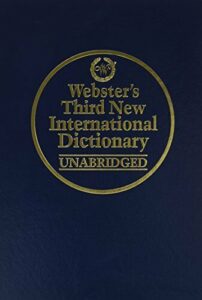 Mention of Dr. Johnson takes me to dictionaries and the fuss and furor that followed the publication of Webster’s Third New International Dictionary (1961).
Mention of Dr. Johnson takes me to dictionaries and the fuss and furor that followed the publication of Webster’s Third New International Dictionary (1961).
This work of scholarship had some radical changes over the earlier edition. It was descriptive rather than prescriptive. It dared to tell how the language was used not how it ought to be used.
Shock and horror ensued across the land.
Exhibit number one: Nero Wolfe:
Fourth Degree: The Book-Burning Detective
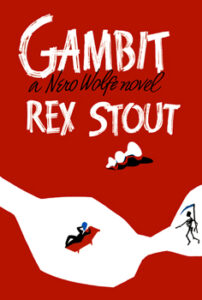 Here’s the opening of Rex Stout’s Gambit published in 1962, Corpulent gourmet and detecting genius Nero Wolfe is at the fireplace feeding pages from Merriam-Webster’s Third New International Dictionary(1961) into the flames
Here’s the opening of Rex Stout’s Gambit published in 1962, Corpulent gourmet and detecting genius Nero Wolfe is at the fireplace feeding pages from Merriam-Webster’s Third New International Dictionary(1961) into the flames
At twenty-seven minutes past eleven that Monday morning in February, Lincoln’s Birthday, I opened the door between the office and the front room, entered, shut the door, and said, “Miss Blount is here.”
Without turning his head Wolfe let out a growl, yanked out some more pages and dropped them on the fire, and demanded, “Who is Miss Blount?”
I tightened my lips and then parted them to say, “She is the daughter of Matthew Blount, president of the Blount Textile Corporation, who is in the coop charged with murder, and she has an appointment with you at eleven-thirty, as you know. If you’re pretending you’ve forgotten, nuts. You knew you couldn’t finish that operation in half an hour. Besides, how about the comments I have heard you make about book burners?”
“They are not relevant to this.” He yanked out more pages. “I am a man, not a government or a committee of censors. Having paid forty-seven dollars and fifty cents for this book, and having examined it and found it subversive and intolerably offensive, I am destroying it.” He dropped the pages on the fire. “I’m in no mood to listen to a woman. Ask her to come after lunch.”
“I have also heard you comment about people who dodge appointments they have made.”
Pause. More pages. Then: “Very well. Bring her here.”
I returned to the office, shutting the door, crossed to the red leather chair near the end of Wolfe’s desk where I had seated the caller, and faced her. She tilted her head back to look up at me. She was a brownie, not meaning a Girl Scout—small ears and a small nose, big brown eyes, a lot of brown hair, and a wide mouth that would have been all right with the corners turned up instead of down.
“I’d better explain,” I told her. “Mr. Wolfe is in the middle of a fit. It’s complicated. There’s a fireplace in the front room, but it’s never lit because he hates open fires. He says they stultify mental processes. But it’s lit now because he’s using it. He’s seated in front of it, on a chair too small for him, tearing sheets out of a book and burning them. The book is the new edition, the third edition, of Webster’s New International Dictionary, Unabridged, published by the G. & C. Merriam Company of Springfield, Massachusetts. He considers it subversive because it threatens the integrity of the English language. In the past week he has given me a thousand examples of its crimes. He says it is a deliberate attempt to murder the—I beg your pardon. I describe the situation at length because he told me to bring you in there, and it will be bad. Even if he hears what you say, his mental processes are stultified. Could you come back later? After lunch he may be human.”
She was staring up at me. “He’s burning up a dictionary?”
“Right. That’s nothing. Once he burned up a cookbook because it said to remove the hide from a ham end before putting it in the pot with lima beans. Which he loves most, food or words, is a tossup.”
“I don’t want to come back.” She stood up. “I want to see him now. I must see him now.”
A little late Wolfe asks Miss Bount an important question:
“Do you use ‘infer’ and ‘imply’ interchangeably, Miss Blount?”
She did fine. She said simply, “No.”
Fifth Degree: In Search of Sausage
“Which he loves most, food or words, is a tossup.” – Sidekick Archie Goodwin on the idiosyncrasies of his boss Nero Wolfe.
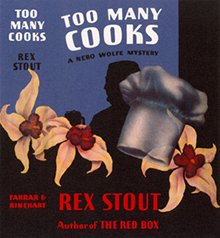 Eccentric genius Nero Wolfe keeps physical movement to a minimum and in all the 33 novels and 41 novellas and short stories from 1934 to 1975, he rarely leaves the house. Home is a brownstone on West 35th Street in Manhattan where he lives with his legman Goodwin, tends to his beloved orchids, reads, and employs a world-class chef to cater to his appetite.
Eccentric genius Nero Wolfe keeps physical movement to a minimum and in all the 33 novels and 41 novellas and short stories from 1934 to 1975, he rarely leaves the house. Home is a brownstone on West 35th Street in Manhattan where he lives with his legman Goodwin, tends to his beloved orchids, reads, and employs a world-class chef to cater to his appetite.
An exception to this routine is recorded in Too Many Cooks. Wolfe is invited to speak at a meeting of international master chefs at Kanawha Spa. His topic is American gastronomy and its contributions to haute cuisine. At the meeting, jealousies arise and one of the chefs is murdered.
The chief suspect is the holder of a recipe for Saucisse Minuit – something that Wolf has longed to possess since first tasting it traveling in Spain. Here’s the story as told in the Nero Wolfe Cookbook
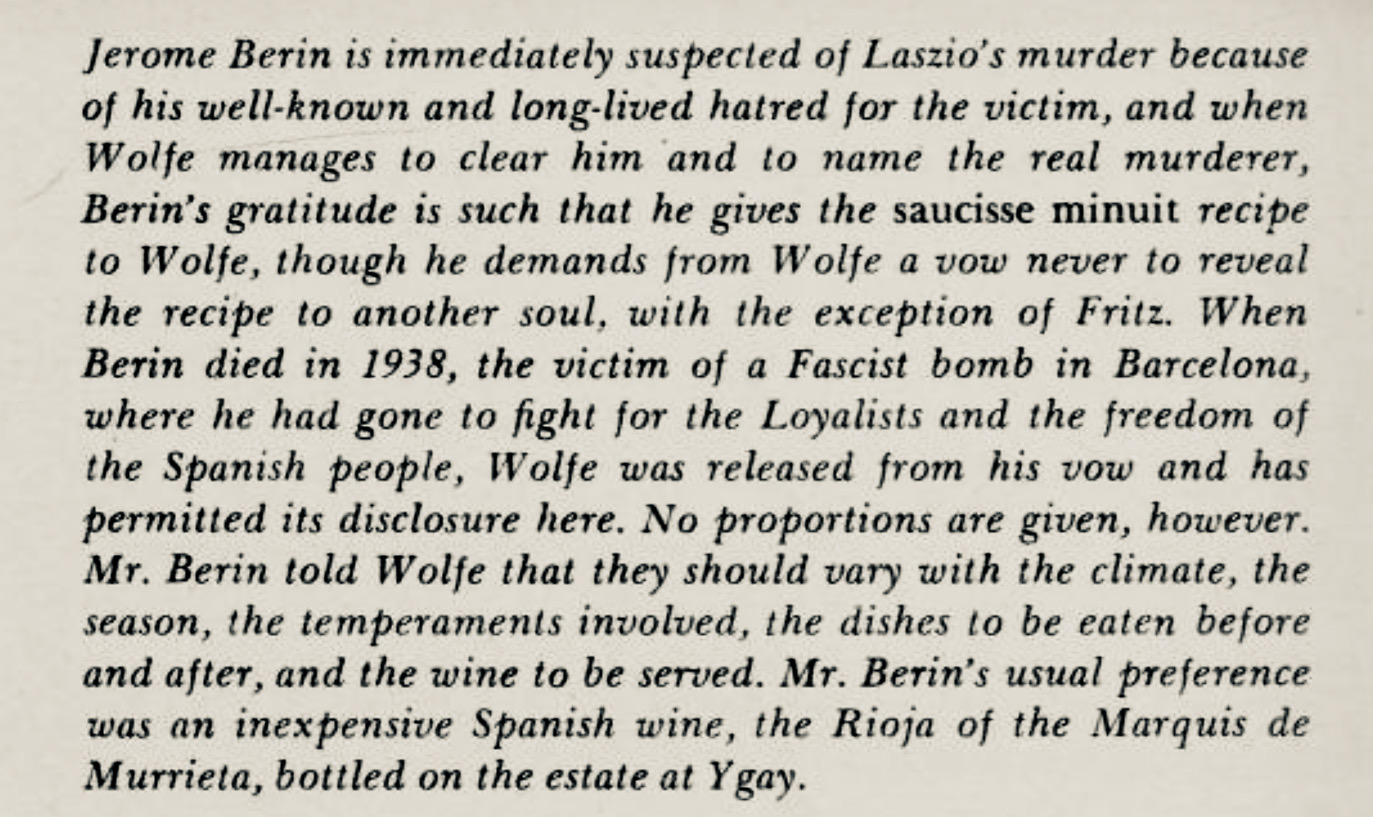
The cookbook also includes the ingredients and cooking method for these fancy sausages.
All of the Nero Wolfe books include at least one description of a meal but alas with no illustrations and that brings me to a delightful book about food and fiction by Dinah Fried. in the book she thanks her parents
Thank you and love to my father, for teaching me to read carefully, and to my mother, for teaching me to look closely.
One of those parents was the Poughkeepsie Day School English teacher Don Fried who taught generations of young people to love literature and to write with precision and all without deadening drills and pedantic and premature attention to punctuation.
Sixth Degree: Fictitious Dishes

Dinah Fried prepared dishes from almost two centuries of fiction. She did the art direction, design, and photography. There’s an extract from each book as well as a few additional facts and observations. It’s all gorgeous although not always so appetizing – the mess of rotting scraps (Metamorphasis, Franz Kafka 1915) being a notable example.
“There were old, half-rotten vegetables; bones from the evening meal, covered in white sauce that had gone hard; a few raisins and almonds; some cheese that Gregor had declared inedible two days before; a dry roll and some bread spread with butter and salt….”
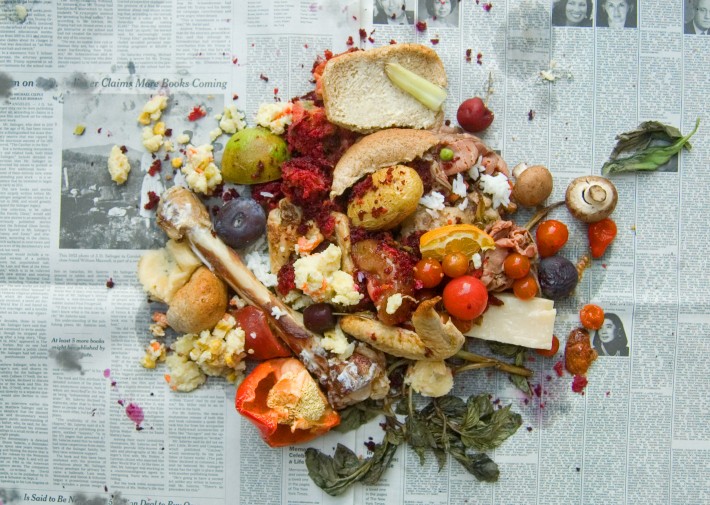
Here’s Swann’s Way by Marcel Proust, 1913:
“One day in winter, as I came home, my mother, seeing that I was cold, suggested that, contrary to my habit, I have a little tea. I refused at first and then, I do not know why, changed my mind. She sent for one of those squat, plump cakes called petites madeleines…”

Oliver Twist by Charles Dickens, 1837: “Child as he was, he was desperate with hunger, and reckless with misery. He rose from the table; and advancing to the master, basin and spoon in hand, said: somewhat alarmed at his own temerity: ‘Please, sir, I want some more.’”

Alice’s Adventures in Wonderland by Lewis Carroll, 1865: “Have some wine,’ the March Hare said in an encouraging tone. Alice looked all round the table, but there was nothing on it but tea.

Here’s the Turkish Delight with which the witch tempts Edmund in The Lion, the Witch and the Wardrobe:

And because it’s almost July 4th here’s one final photo featuring the great American hot dog.
A Confederacy of Dunces by John Kennedy Toole, 1980: “Stopping before the narrow garage, he sniffed the fumes from Paradise with great sensory pleasure, the protruding hairs in his nostrils analyzing, cataloging, categorizing, and classifying the distinct odors of the hot dog, mustard, and lubricant.”

I wonder what Dinah Fried would have done with a dish from the camel recipe from T.Coraghessan Boyle’s quite wonderful debut novel Water Music (1981)?
(First, find your camel. Good luck with the bustards. And be sure to invite all of your best friends.)
Stuffed Baked Camel (serves 400)
500 dates
200 plover eggs
20 two-pound carp
4 bustards, cleaned and plucked
2 sheep
1 large camel
seasonings
Dig trench. Reduce inferno to hot coals, three feet in depth. Separately hard-cook eggs. Scale carp and stuff with shelled eggs and dates. Season bustards and stuff with stuffed carp. Stuff stuffed bustards into sheep and stuffed sheep into camel. Singe camel. Then wrap in leaves of doum palm and bury in pit. Bake two days. Serve with rice.
Enjoy!

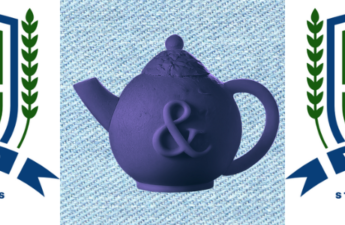

I love the malleability of language. It should always be freed of its chains. (K)
Abso-bloomin-lutely
An intriguing opening and a delicious finish. Thank you, Josie. What a joy.
Fictitious Dishes sounds especially interesting!
It really is a lovely book. One of those volumes it is a pleasure to hold and browse through.
Good to know, Josie!
Ahh yes, remember it well: Wonald Widout, as our English teacher used to say…
“Take out your Widout”. Was that Mr. Jenkins?
I don’t actually recall much Ridout but that may be because I figured out that you didn’t need all that grammar stuff for the “O” level if you were happy to take your chances with the vocabulary alternative.
Mr Jenkins indeed. Also spoke of Watty in “The Wind in the Willows”.
My education was very muddled and quite lacking in a lot of what might be called essentials. Consequently, my punctuation is random perhaps eccentric, but I think it no longer matters. I think I would like to have at least known when I was going astray!
I guess the real issue is: How and when is such information best learned?